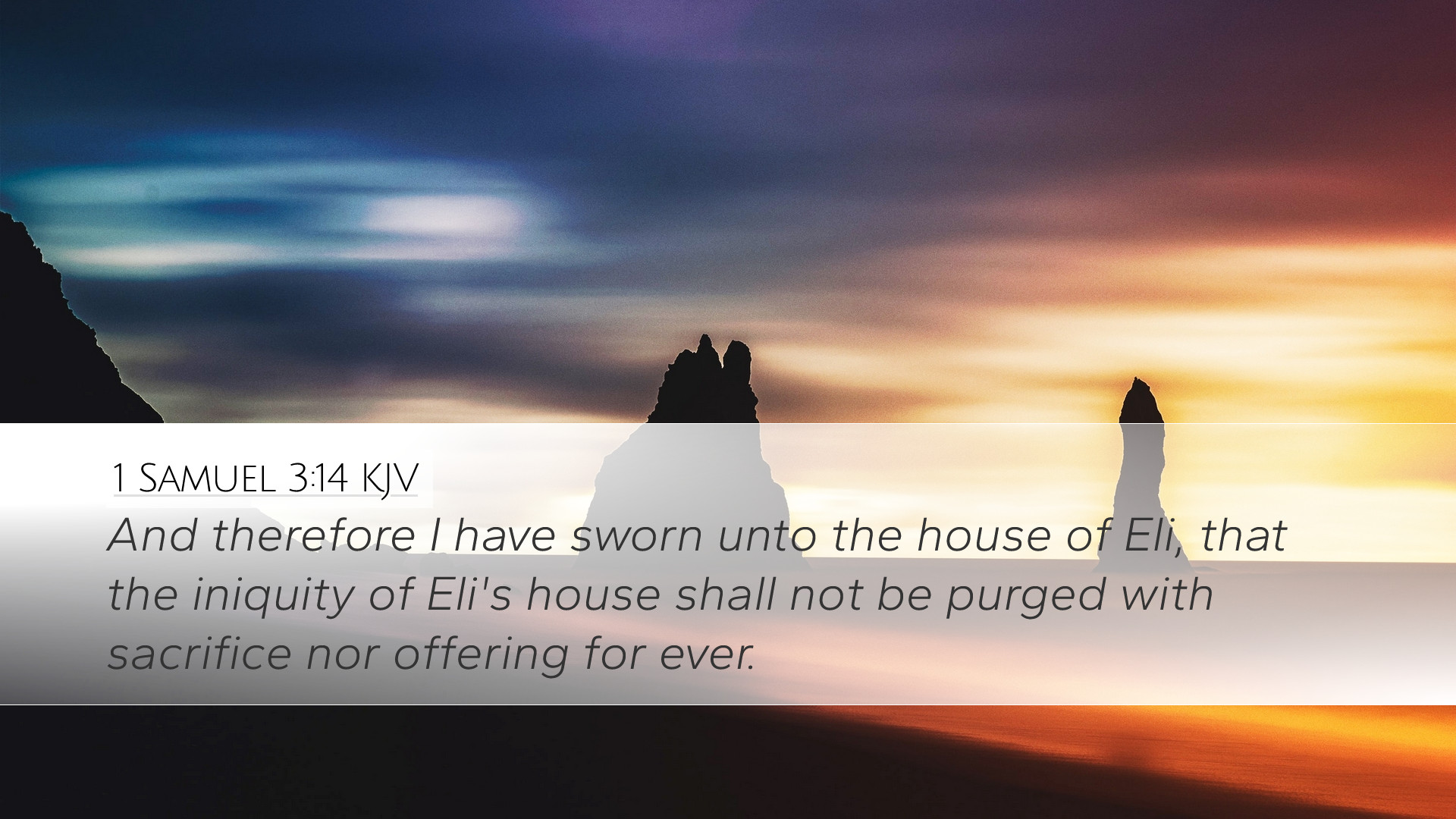Commentary on 1 Samuel 3:14
Text: "And therefore I have sworn unto the house of Eli, that the iniquity of Eli's house shall not be purged with sacrifice nor offering forever." (1 Samuel 3:14, KJV)
Introduction
The verse before us is a solemn declaration from God regarding the house of Eli, a priest and judge in Israel. It encapsulates themes of judgment, the seriousness of sin, and the irrevocability of divine judgment in the face of persistent disobedience.
Historical Context
The backdrop of this verse is critical for understanding its weight. Eli's house represents leadership in Israel, and his sons, Hophni and Phinehas, are central to the narrative, embodying corruption within the priesthood. This scripture signals a pivotal moment where divine retribution is articulated for their ongoing rebellion against God's commandments.
Matthew Henry's Insights
Henry reflects on the gravity of the Lord's determination to cut off Eli's lineage. He explains that the swearing of God serves as a confirmation that the sins committed by Eli's family have reached a point of no return. According to Henry, this also emphasizes that God’s longsuffering has limits, as shown by the persistent corruption of Eli's sons despite repeated warnings.
Key Points from Henry:
- The finality of God's judgment on Eli's house.
- God's judgments are based on the nature of the sin and the unrepentant heart.
- The seriousness of serving in a spiritual role, which carries immense responsibility.
Albert Barnes' Commentary
Barnes focuses on the implications of this divine refusal to accept sacrifices or offerings for Eli's house. He expounds on the notion that mere ritualistic practices cannot atone for grave transgressions against God’s holiness. It establishes a prophetic statement regarding God’s displeasure and the ineffective nature of sacrifices performed without genuine repentance.
Key Points from Barnes:
- God values repentance over ritualistic sacrifices.
- This verse serves as a precedent for future dealings with Israel, illustrating that true contrition is essential.
- It highlights the difference between external observance and internal holiness.
Adam Clarke's Analysis
Clarke brings a deep theological insight into the implications of God swearing concerning Eli's family. He emphasizes the concept of divine authority and sovereignty. To Clarke, the phrase “shall not be purged with sacrifice nor offering forever” unfolds the theological reality that certain sins, especially those of leaders, lead to irrevocable consequences for their lineage.
Key Points from Clarke:
- The nature of divine judgment is depicted as both swift and patient.
- Clarke elaborates on the importance of accountability in spiritual leadership, revealing that leaders bear the weight of their influence over others.
- The intersection of divine grace and judgment is poignantly illustrated through God’s severe stance against unrepentant sin.
Theological Implications
The verse presents profound theological implications regarding sin, judgment, and divine forgiveness. It indicates that while God is merciful, His holiness demands that sin be addressed comprehensively. The irrevocable nature of Eli's judgment reinforces that there are consequences for failing to lead rightly and for leading others astray.
Practical Applications for Pastors and Leaders
1. Emphasize the Weight of Responsibility: Leaders must recognize how their personal conduct affects the spiritual health of their communities.
2. Encourage Genuine Repentance: It is critical to lead congregations into a deeper understanding of the necessity of heartfelt repentance rather than superficial acts of worship.
3. Acknowledge the Seriousness of Faculty Integrity: The narrative serves as a reminder that grace does not exempt anyone from accountability; particularly those in positions of authority.
Conclusion
1 Samuel 3:14 highlights a significant turning point in biblical history and theology. The ultimate fate of Eli’s house serves as a warning regarding the irrevocable nature of God’s judgment when there is deliberate and continued sin. For scholars, students, and pastors alike, it is a compelling exhortation to pursue holiness, uphold integrity, and recognize the depth of God’s justice and mercy in our respective walks with Him.


